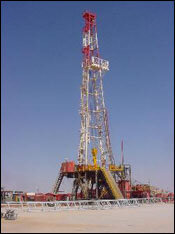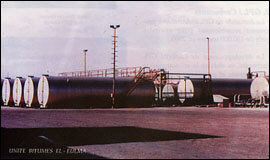
| 
 Introduction - Privatization - Partnerships - Investment - Oil and Gas - Mining - Introduction - Privatization - Partnerships - Investment - Oil and Gas - Mining -
Electricity - Building for the future - Telecoms - Air and Sea - Private Sector - Finance -
Going Public - Image is everything - Tourism - Conclusion 
 PARTNERSHIPS AND JOINT VENTURES: THE WAY AHEAD PARTNERSHIPS AND JOINT VENTURES: THE WAY AHEAD |
As the Algerian energy sector changes, so is Sonatrach. Among the 17 divisions currently evolving within the fields of engineering, project realization and petrol services, none are more important than the following four companies: ENTP, GCB, Enafor and Naftal.

ENTP (Entreprise Nationale des Travaux aux Puits) has accumulated over US$ 100 million in sales, and is currently ranked as the 16th most profitable enterprise in the country. The leading contractor for oil drilling in Algeria was created 33 years ago, and has consistently generated substantial profits over the past six years. Along with its subsidiary, DECO (a partner of Deutag), ENTP secures strong performances for Sonatrach, Anadarko, Cepsa, Occidental and Arco in the categories of petroleum maintenance, transport and catering.
Mr. Krissat, Managing Director of ENTP, confirms: "Our goal is to maintain our leadership over all drilling work in Algeria. To achieve this, we must enhance the quality of our technical capacities by appealing to one or more of our financially secure and technologically advanced partners". Finding investors should be easy. Kissat lists his company's assets with the confidence of a true oil baron. "Our outfield staff has an average of twenty. We have at our disposal an advanced logistics of accompaniment that encompasses all aspects of drilling - from monitoring performance to the maintenance and transport of equipment to catering, which plays a decisive role in desert areas". Krissat has high expectations for the privatisation of Sonatrach (of which ENTPis a branch). He believes that it would be necessary to put in place a "program to stabilize, streamline and secure the take off of its branches without damages nor disorders." Though this process might take some time, he states that "ENTP is no longer in a position to self-finance the modernization and renewal of its important equipment as well as supplying its markets. To sort out this issue, we are authorized and ready to open our capital".
"In short we are wishing that ENTP' s privatization could lead to a dynamic win-win opportunity for expansion", adds Krissat.
Meanwhile, GCB, a company specialized in civil engineering and infrastructure, is developing a similar position. According to GCB's Managing Director, Abdelhamid Zerguine: "the development of GCB cannot take place outside of the greater goals of the government which involve the letting go of all potential spheres. GCB will be more inclined to move forward faster than some other branches because of its healthy financial situation. Future shareholders will have the chance to manage a company that grosses annual profits of US$ 19, 000". While annual profits such as these one are enough to make any investor salivate; the fact that GCBhas multiplied its sales by 20 in the last ten years (for a current net revenue of US$ 1.9 million) should induce foaming at the mouth. As the liberalization of the sector approaches, GCB stands on the threshold of becoming an international-quality brand by virtue of its association with world class engineers combined with heavy investment in everything from hydraulics to railways to dredging of ports. | "At present GCB is looking for a joint-venture with an eventual partner. We are open to the joint creation of a new corporation, in addition to the sale of capital ownership," adds Zerguine. In order to modernize its operations, GCB is presently attempting to partner with an equipment leasing company.
"Liberalisation in the energy and mining sector has certainly created a more competitive environment", says Daoud Sahbi, General Manager of ENAFOR, the national drilling company. "Competition is increasing, and the challenge is now to maintain our leading position in the market." In order to compete on an international level, an investment renewal program was initiated by ENAFORin 1992, new technologies such as horizontal drilling and re-entry drilling were adopted ", adds Sahbi.
Besides the development of new partnerships, ENAFOR has recently established a new mining subsidiary together with the Italian industrial giant ENI. "We are reducing costs, building more wells and discussing various partnership opportunities with foreign companies in order to create new alliances" says Sahbi. "We are definitely open to all forms of partnership". With predictions by the Minister of Energy and Mines that petroleum production will increase by 50% during the next three years, it is clear that business opportunities for drilling activities will only continue to increase in the years to come.
On the other hand, with 10% of its sales volume in Algeria - the only market where presently active, Naftalis enjoying a leadership position in the distribution of Liquefied Petroleum Gas (LPG). The sale of
fuels constitutes 78% of total sales, of which 80% take place at the 1650 petrol stations distributed throughout the country. Part of the same industrial group as Sonatrach and Naftec, Naftal posted sales of US$1.8 million for its annual output of 1,2 million tons of LPG. The company has a workforce of 29, 000 employees and storage capacities of up to 800,000 m3.
Unlike Sonatrach and Naftec, and it order to retain its dominant market share once the sector is liberalized, Naftal must develop new upper-level marketing strategies on its lubricants, asphalts and pneumatics.

Naftal Managing Director, Hocine Chekired says: "we have set a five-year infrastructure development plan of about US$ 400 million. This program requires a very reactive management and a dynamic partnership. We are looking at a range of projects for which the modernization of our storage and transport equipment is of the utmost importance".
In order to increase its potential, Naftal is mapping out its development program together with Sonatrach. " Our goals can be achieved by capturing new sales opportunities for refinery products," states Chekired. " Our capacity for the production of large consumer goods can result in perfectly exportable surpluses like gas oil with a low sulphur content, which is a very competitive product in the western markets". With regard to foreign operators, Chekired believes that "the modernization of pipelines and other structural innovations will pave the way for partnerships as well as technological exchanges". Naftal is just as eager to attract private investors for LPG market activities on a national as well as international level, seeing as "the fuel continues to penetrate the market at medium term". |
© World INvestment NEws, 2001.
This is the electronic edition of the special country report on Algeria published in Forbes Global Magazine. 12th November, 2001 Issue.
Developed by AgenciaE.Tv Communication |
|
|
| |
| | | |
|

